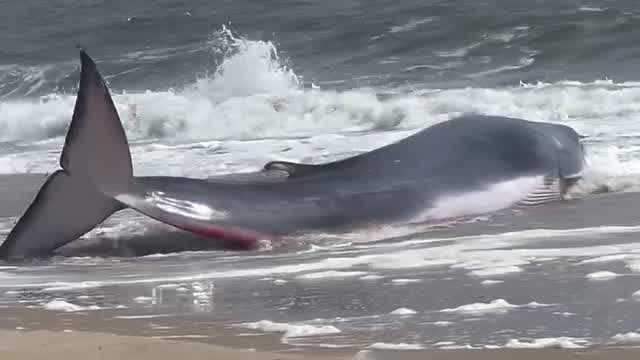Over the weekend, a somber scene unfolded along the shores of Delaware when a beached whale was discovered near the Indian River Inlet Bridge at approximately 11 a.m. The sighting of the distressed animal prompted a swift response from concerned individuals and wildlife experts alike.
According to representatives from the Marine Education, Research, and Rehabilitation Institute (MERR), the stranded whale was identified as a sub-adult fin whale, measuring an imposing 50 feet in length. However, the initial observation painted a grim picture, as the whale appeared severely emaciated, indicating potential underlying health issues.
Fin whales, known as off-shore, deep-sea dwellers, rarely find themselves near coastal areas unless they are in a weakened state, as noted by MERR. The precarious condition of this particular whale raised concerns among experts, who feared it was nearing the end of its life.
Efforts to assist the distressed whale faced significant challenges due to the treacherous water conditions and strong waves. Despite the best intentions of MERR officials to approach the animal and administer sedation to alleviate its suffering, the rough seas rendered these efforts futile.
In response to the outpouring of concern from the public, a representative from MERR expressed gratitude for the support and offers of assistance. They assured concerned individuals that the situation was being closely monitored, with updates to be provided as new information became available. However, due to the overwhelming volume of inquiries, they cautioned that they may not be able to respond to all calls and requests immediately.
As the stranded whale’s plight captivated the attention of both locals and wildlife enthusiasts, it served as a poignant reminder of the delicate balance between humans and marine life. Despite the valiant efforts of experts to aid the distressed creature, the outcome remained uncertain, highlighting the vulnerability of these majestic animals in the face of environmental challenges.















































